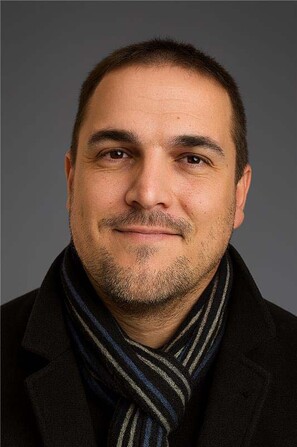Tom Robinson, the Head of Innovation at Australia's largest not-for-profit private health insurer, HCF, used his presentation to the recent AI Health Summit to frame the company's approach as a tension between honouring almost a century of mutual stewardship and not abandoning the future to less scrupulous actors.

Robinson anchored his talk in HCF’s history.
The fund was founded in 1932, long before the PBS, Medicare or even penicillin, by Australians who agreed to pool their resources and insure one another against medical risk. “For close to a century,” he said, HCF has been a mutual organisation, "helping each other out when things go wrong,” and that legacy comes with serious obligations.
He described the promises made to members, the insurance commitments and the data collected over generations as “entirely non-negotiable” assets that cannot be put at risk. At the same time, he warned that moving too slowly on AI carries its own danger.
“It’s coming, it’s happening,” he said. “And if we are the good guys in the room and we move too slowly and don’t shape what happens, then by definition it’s the bad guys who get to. And that’s a scary thought.”
For Robinson, that creates two risks that are not about “balancing” one against the other, but protecting member data and legacy, while also exercising stewardship over the future.
Robinson argued that the sector’s ambitions for AI are often too limited.
He hears a lot of talk about automation, headcount reduction and three people doing the work of thirty. “I think that reflects a paucity of ambition,” he said. Instead, he argued, health organisations should be aiming to use AI to become “smarter, not just faster”.
He cited a recent visit from Mo Gawdat, former Chief Business Officer at Google X, who claims that with the eight AIs he uses every hour, he can effectively score 80 to 90 points higher on an IQ test. Robinson offered this as an example of AI as an intelligence amplifier rather than a mere productivity tool.
He also views AI as a means to make healthcare organisations “more human”. He said many people describe their experience of AI as surprisingly empathetic. That opens up space, he suggested, to use AI for deeper listening, more personalised experiences and better emotional support, rather than simply chasing cost savings and “the spectre of mass unemployment”.
“The good guys,” he argued, “have an obligation to look to what the future looks like post-AI and start building it now in the use cases that we adopt now.”
Robinson said HCF’s 'Active Locals' platform was built in response to a challenge from the executive and CEO. Could the innovation team do something meaningful about declining physical activity, social connection and participation in local sport?
After a discovery process that surfaced around ten viable concepts, Active Locals emerged as the winning idea. Robinson described it as a way for people to find things near them that match their interests and personality.
“If you’re the kind of person who loves puppy yoga and runs clubs, it’ll suggest puppy yoga and run clubs,” he said. “If you’re the kind of person like my nephew and niece who love hunting Pokémon, it’ll suggest that and connect you with groups and help you build social connections and help you incidentally have physical activity in a way that you would never call exercise.”
Behind the scenes, he said, AI has been critical to making the platform possible. He said AI means multiple things in his workplace. It can include large language models, some traditional machine learning, automation tools and a core algorithm stitched together to perform a defined role. At scale, he said HCF is now working with around 30 such AI co-workers.
Despite the speed and scale, he emphasised that “the human stays in the loop” and that HCF’s core claims and patient data are kept entirely separate in a “sandboxed” environment. None of the AI tooling used for Active Locals has access to the insurer’s core systems, and any potential change that touches member data “is not happening at the speed of light at the end of a meeting,” but instead goes through governance and the board.
“It is non-negotiable that we keep those things safe,” he said.
Robinson said one of the most interesting benefits has been the way AI can help surface patterns of need and “empathy segments” in the discovery stage.
Using survey data gathered in partnership with patient groups and Australians in their homes, the system quickly highlighted groups such as people in complex caring roles, and what it labelled “social butterflies”, or people who are effectively “medicating for their mental health through social engagement” and define health through the depth and quality of their social connections.
Machine learning helped identify these patterns. Large language models then made it possible to “interview” or survey virtual versions of these segments, synthesising tens of thousands of responses and producing results that were “terrifyingly similar” to traditional surveys. Robinson said he can now get the equivalent of a hundred user feedback sessions in a day.
Internally, Robinson said HCF has adopted the framework of “faster, smarter, more human” to challenge itself in the realm of AI. He said it is a natural fit for an organisation “full of people who joined it because it was a member-owned, member-driven organisation.”
Some use cases, particularly those that involve the insurer’s core systems, will take longer as the company navigates governance and regulatory requirements. In the meantime, he encouraged others to consider creating their own 'sandbox' spaces, such as Active Locals, where they can safely experiment and gain experience.
He also suggested AI will, over time, change how organisations hire. As AI brings more expertise into the room, he argued there will be “less and less of a role for human expertise” in the narrow sense, and more emphasis on initiative, empathy and the ability to put expertise to work in ways that an expert might never conceive.
Robinson closed with a challenge to other “good guys.”
“I think there’s a little extra responsibility for us to show it works, to create specific use cases with data and to share some of that data so that everybody else can do the good things too," he added.
